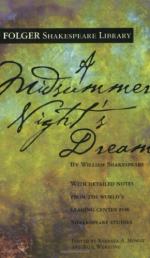|
This section contains 12,687 words (approx. 43 pages at 300 words per page) |

|
SOURCE: "'Shaping Fantasies': Figurations of Gender and Power in Elizabethan Culture," in Representations, Vol. 1, No. 2, Spring, 1983, pp. 61-86.
In the following excerpt, Montrose argues that A Midsummer Night's Dream calls attention to itself as both a product and a producer of Elizabethan attitudes regarding the relationship between gender and power.
I
Shakespeare's Duke Theseus formulates policy when he proclaims that "The lunatic, the lover, and the poet / Are of imagination all compact"; that "Lovers and madmen have such seething brains, / Such shaping fantasies, that apprehend / More than cool reason ever comprehends." The social order of Theseus' Athens depends upon his authority to name the forms and his power to control the subjects of mental disorder. The ruler's task is to comprehend—to understand and to encompass—the energies and motives, the diverse, unstable, and potentially subversive apprehensions of the ruled. But the Duke—so self-assured and benignly condescending...
|
This section contains 12,687 words (approx. 43 pages at 300 words per page) |

|


